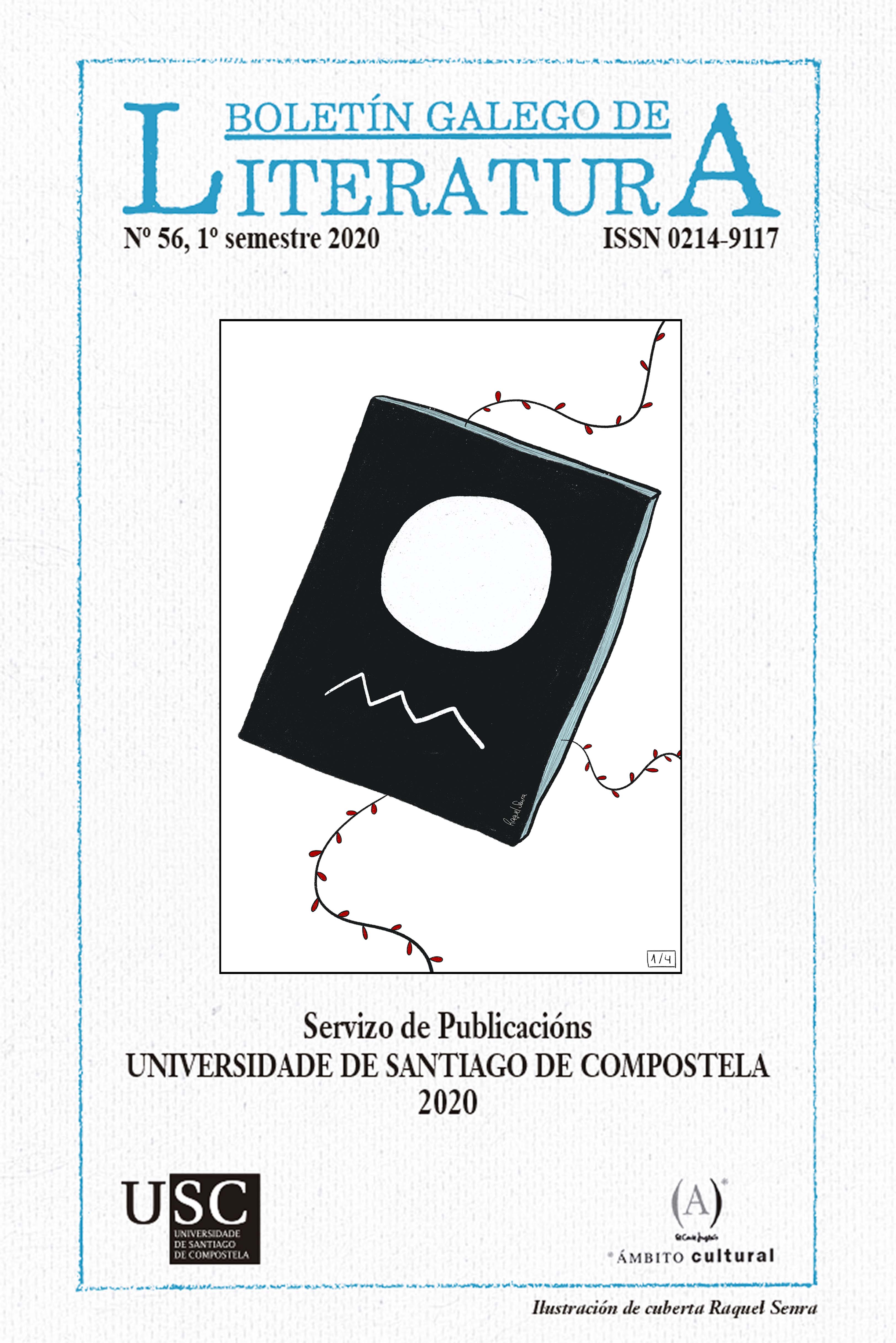Adiós, María: reception and critical fortune in Grial in the seventies
Main Article Content
Abstract
Xohana Torres’ novel, Adiós, María, published in 1971, won the 1970 Galicia Prize convened by the Galician Center from Buenos Aires, which is considered one of the most prestigious literary awards at the time. However, the first and only novel by Xohana Torres didn`t get sufficient attention of criticism. The few and occasional contributions which were appearing separately proved to be insufficient and superficial, providing evidence of the lack of interest in the moment of its appearance. Having this into account, in the first part of this study will be conducted an approaching of the context and the relevance of Galicia Prize for Xohana Torres and then offering an analysis of the controversy surrounding the awarding of the prize to this writer. In the second part, it will be offered a review of the comments about the novel in journal Grial between 1970 and 1980.
Keywords:
Article Details
References
Alonso Girgado, L., Cuquejo Enríquez, M. e Fariña Miranda, C. (Eds.) (2004). Cadernos Ramón Piñeiro, V. Cartas de Ramón Piñeiro a Ricardo Carballo Calero. Dirección Xeral de Política Lingüística e Centro Ramón Piñeiro para a Investigación en Humanidades. https://www.cirp.gal/w3/publicacions/pub-0163.html.
Álvarez Cáccamo, X. M. (2012). Prólogo: Unha longa conversa de amizada e cultura. Correspondencia entre Isidoro Millán González-Pardo e Xosé María Álvarez Blázquez. En X. L. Cochón Touriño (Ed.), Cadernos Ramón Piñeiro, XXI. Correspondencia habida entre Xosé Mª Álvarez Blázquez e Isidoro Millán González-Pardo (pp. 9-17). Xunta de Galicia e Centro Ramón Piñeiro para a Investigación en Humanidades. https://www.cirp.es/w3/publicacions/pub-0341.html.
Álvarez Ruiz de Ojeda, M. V. (1995). Conversas con Eduardo Blanco Amor. Nigra.
Andrade Cobas, J. R. (1999). Galleguidad en la Argentina. Xunta de Galicia.
Anónimo. (1970). O Premio “Galicia” de novela, a Xohana Torres. Grial, 30, 503.
Bermúdez, T. (2002). Unha lectura de… Adiós María de Xohana Torres. Edicións Xerais de Galicia.
Bermúdez, T. (2010). Adiós María ou o espertar da autoconciencia feminina na narrativa galega. Ferrol análisis, 25, 186-199.
Brea López, M. M. (1972). “Adiós, María”, de Xohana Torres. Estructura e persoaxes. Grial, 37, 344-352.
C. (1978). Unha novela popular. Grial, 59, 119-120.
C. Muruais, P. (1972). Hacia el desarrollo de la novela gallega. Triunfo, 484, 46.
Casares, C. (1973). Leria con Eduardo Blanco-Amor. Grial, 41, 337-344.
Cochón Touriño, X. L. (Ed.) (2012). Cadernos Ramón Piñeiro, XXI. Correspondencia habida entre Xosé Mª Álvarez Blázquez e Isidoro Millán González-Pardo. Xunta de Galicia e Centro Ramón Piñeiro para a Investigación en Humanidades. https://www.cirp.es/w3/publicacions/pub-0341.html.
Cochón, I., Fernández, L., Fortes, A. B., Gonzalez Fernández, H., Monteagudo, H., Nicolás, R., Ríos Panisse, M. do C., Vilavedra, D. (Eds.) (1995). Diccionario da Literatura Galega I. Autores. Galaxia.
Fernández del Riego, F. (1971). Adiós, María, por Xohana Torres. Grial, 33, 364-366.
Fernández Rodríguez, Á. (2014). Los exiliados gallegos de la II República. Grandes aportaciones pero escasa visibilidad. Cuadernos Hispanoamericanos, 768, 20-42.
Galanes Santos, I. (2017). Memorias dun neno labrego: a forxa dun Longseller. Madrygal. Revista de Estudios Gallegos, 20, 113-126.
Gerhardt, F. (2015). Asociacionismo gallego y mercado del libro en la Buenos Aires del medio siglo: dos proyectos editoriales de Luís Seoane. Madrygal. Revista de Estudios Gallegos, 18, 457-467.
González, H. e Lama, M. X. (Eds.) (2009). Do sentimento á conciencia de Galicia: correspondencia (1961-1984) de Ramón Piñeiro e Basilio Losada. Xunta de Galicia e Galaxia.
Soto, J. (1972). La novela gallega. Triunfo, 487, 43.
Torres, X. (1971). Adiós, María. Ediciones Galicia e Edicións Castrelos.
Most read articles by the same author(s)
- Laura Caamaño Pérez, Imagological analysis of cadalsian character Gazel’s narrative discourse in Cartas marruecas , Boletín Galego de Literatura: No 54 (2019): 1º semestre
- Laura Caamaño Pérez, El grupo Nós. Vicente Risco, Castelao, Otero Pedrayo, Florentino Cuevillas y Antonio Losada Diéguez , Boletín Galego de Literatura: No 54 (2019): 1º semestre
- Laura Caamaño Pérez, María Victoria Moreno. Homenaxe. Palabra fértil no tempo , Elos: Revista de Literatura Infantil e Xuvenil: No 6 (2019)
- Laura Caamaño Pérez, Proposal of analysis of projected spaces in La Busca by Pío Baroja , Boletín Galego de Literatura: No 55 (2019): 2º semestre
- Laura Caamaño Pérez, O ollar clarividente de Isaac Díaz Pardo: colaboracións xornalísticas (1963-2009) , Boletín Galego de Literatura: No 55 (2019): 2º semestre
- Laura Caamaño Pérez, Roberto Vidal Bolaño. Unha poética teatral xenuinamente galega , Boletín Galego de Literatura: No 56 (2020): 1st semester
- Laura Caamaño Pérez, Carvalho Calero. Vida e obra dun ser polifacético , Boletín Galego de Literatura: No 57 (2020): 2nd semester







